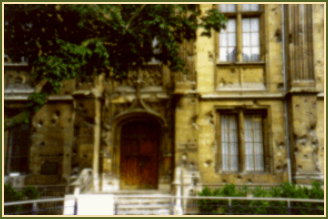
 Saint Jeanne d' Arc, Martyr  Biography, Page 3  Saint Jeanne d' Arc by Sister Marie-Bernard, M.I.C.M SOURCE: FROM THE HOUSETOPS, Vol 38, No. 1, Serial No. 74 Fading Glory Making the best of it she planned future campaigns, knowing how easily and swiftly the complete expulsion of the English from France could be accomplished. But the apathy of the king and his advisors, on the other hand, constantly oppressed her. After tiresome and tedious months of court life, where murmurings and jealousies were rising against her, she was finally sent to march on Paris. With renewed vigor she took up this next work. But conspiracies and envious plots had been laid to baffle and defeat her designs for the complete reconquest of France. On the feast of Our Lady's Nativity, September 8th, she led the assault on Paris. All day she urged and directed her soldiers, though it seemed that they held back. Sunset had come and still she pressed her soldiers to take the place. Suddenly she was shot through the thigh with the bolt from a crossbow. Refusing to be moved from the field, she urged her soldiers to continue the fight, but her generals dragged her away from the danger, and the assault was abandoned. The King sent word to retreat. Unwillingly Jeanne had to leave Paris to the enemy. Shortly after, through Charles' political councilors, a truce was signed with the Duke of Burgundy. The royal councilors had feared nothing as much as a recurrence of the old enthusiasm about Jeanne. They intended that she would ride for a fall and not a victory. They had hampered and embarrassed her army in every way, especially in the matter of supplies and payment of the soldiers. So Jeanne was forced to ask for help from her friends in Orleans and other places. And those nobles who assisted her suffered all the worse from the council. The heroic Maid suffered disaster after disaster, as penalty for the crime of trying to liberate her countrymen. The malignant members of the French council who did not seek the unity and peace of France, but rather their own comfort, reveled in their so-called victories. Jeanne La Pucelle, the invincible one, was beaten at last! They had humbled the peasant who had dared to dictate to king and council. Soon a great wave of dissension had begun to extinguish the blaze of glory lit by the Maid of Orleans. The Voices had been silent during the attack on Paris leaving the siege to her own discretion. The King had put an end to the battle, and though coward that he was, the Saints could not tell Jeanne to act against his word. And when the treaty had at last been signed, they bid her leave. It was a lonely Jeanne d'Arc who made her way to the Cathedral of Saint Denis. There, before Our Lady's altar, she unbuckled her beloved armor, and in tears, placed it at the feet of the Help of All Christians, resigning herself to the will of God.
Long and dreary months followed for Jeanne. She had been torn away from the few trustworthy soldiers she counted as friends, and from her army which for the most part had been disbanded. It became clearer every day that her worst enemies were of her own people. For a while she retired from active service and spent many hours in prayer, good works, and visiting the wounded and dying in military hospitals. The poor found a wealth of sympathy and love in her, and held her as an idol. Many women came to have her bless or touch religious articles such as rosaries and medals, but Jeanne would laugh and say, "Pray, touch them yourselves, it will do as much good." Once she was called to an unBaptized baby who lay dead in its mother's arms. She prayed near the child and it roused to life once again. Denying that she had performed a miracle, she insisted that she had only "trusted in God's goodness to save the child's soul . . . and joined the other women in prayer that the baby might be Baptized." Often people would declare that she lived a charmed life and that no weapon could harm her. But smiling at their superstition, she would remind them that she had already been severely wounded twice and that her life was "no more secure than any other which is exposed to the fire of the enemy." City of Betrayal With the return of spring Jeanne was once more able to take up arms in service of her king and country. The English and Burgundians were concentrating their forces around Compiègne, and she decided to try and break through their fortifications and bring succor to her countrymen and scatter the encircling troops. Before her arrival into the city her Voices had warned her that before the feast of the Baptist's Nativity in June she would be the captive of her enemies. Her one prayer was that if it was to be so, she might die immediately and not suffer a long drawn-out captivity. It must have been a terrifying thought to this eighteen year old girl, for after Mass one day she said to those accompanying her, "I bid you, dear friends, mark well that I have been sold and betrayed and shall shortly be put to death. Pray, I beseech you, for me without ceasing, for my service to the king and his kingdom is coming to an end." It was the afternoon of May 23rd, when Jeanne, with five hundred men, rode from Compiègne over the bridge and captured the enemy's outposts. The Burgundians caught sight of the Maid dressed in full armor and a crimson and gold robe, and drew together a hurried attack. Far outnumbered, her small army fell back, while in the meantime the English arrived and attacked from the rear. Jeanne saw the danger and rushed her charger to cross the bridge and take shelter in the city. But as she reached the drawbridge, it suddenly drew up and the gates of the city which she had come to save closed against her. In the following struggle, she was dragged from her horse, bound as a captive, and as a great cheer burst out from the English and Burgundian ranks, was led away. Without delay she was carried off to Beaulieu in Picardy. Valuable Prisoner When asked to give her word of surrender as a prisoner, her reply was probably her proudest answer, "I have sworn and given my faith to another than you, and I will keep my word." Her only thought during the early months of captivity was to escape and help defend the town of Compiegne. She once locked in her jailor and nearly escaped but was prevented by the porter of the castle. Soon afterwards she was moved to the tower of the Castle of Beaurevoir near Cambrai. It was here that she heard rumors that she was to be sold to the English and in a desperate attempt to flee tried to lower herself out of the tower by way of a makeshift rope. No sooner had she begun her escape than it broke, and she fell sixty feet to the rocks below. When her captors found her she was unconscious. She had been miraculously preserved from death by Saint Catherine, and did not even suffer from one broken bone, but for three days afterwards she could not eat or drink. During all the time that Jeanne had been taken and held captive, no word was heard from the King she had fought so valiantly for. The disgraceful ingratitude and apathy of Charles and his advisors in leaving the Maid to her fate was unpardonable. Even if military force could not have returned her, surely they had valuable English pris- oners for whom they could have traded their young heroine. But no one lifted a finger to help her. Finally in the autumn of 1430, the "Savior of France" was sold to the English by the Burgundians for the price of a king's ransom, a sum of 10,000 gold francs [equivalent to about $2,800,000 in modern money!]. The English feared their prisoner with a superstitious terror. They were determined at all costs to take her life because of this and because they were ashamed of the dread she inspired. She couldn't be executed just because she had beaten them in battle, so they sought to disgrace and convict her as a witch and a heretic, rousing public sympathies on a higher level than political motives. The sentence would be terrifying and she would die as one damned. Distrustful of the reaction of citizens in Paris, her enemies made plans to move her trial to Rouen where they were more likely to achieve the end they wished for. At Rouen, for the two months preceding the trial, she was locked up in a dungeon-like room in the tower. Inside this room she was kept in an iron cage, chained by the hands, feet and neck, as a wild beast who couldn't even be trusted behind bars! Later she was moved to a different room which held only a rude bed to which she was chained by the feet to a large beam. She was guarded by five English soldiers, three who stayed in the room with her day and night and two who guarded the door. These men were described by names which leave no doubt as to their character-----"they were pillagers of houses, who committed nameless outrages on the people of the country ." Their conduct toward Jeanne showed that they were of the basest degree. They had sworn to "guard" Jeanne well, giving her no hope of escape. They amused themselves by tormenting her with the threat of approaching death, mocking her , and attempting to do her immoral violence. With the exception of these wretched guards, no one was allowed to visit her unless authorized by the presiding judge.  E-MAIL
E-MAIL  HOME---------------BACK TO SAINTS-----------------LITANIES SAINT BENEDICT CENTER: FROM THE HOUSETOPS MAGAZINE www.catholictradition.org/Saints/joan3.htm |
